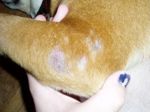Difference between revisions of "Mites"
(Redirected page to Category:Mites) |
|||
| (One intermediate revision by the same user not shown) | |||
| Line 1: | Line 1: | ||
| − | + | {{review}} | |
| + | <categorytree mode=pages style="float:right; clear:right; margin-left:1ex; border:1px solid gray; padding:0.7ex; background-color:white;">Arachnida</categorytree> | ||
| + | ==Astigmata (mites) introduction== | ||
| + | [[Image:Mange.jpg|thumb|right|150px|Mange on a dog - Wikimedia Commons]] | ||
| + | Mites (Suborder: Astigmata) | ||
| + | Mites are one of the most successful and diverse vertebrate groups. The species of veterinary importance are parasitic, although a few non-parasitic mites are also important, such as oribatid mites (intermediate hosts for [[Anoplocephala|''Anoplocephala'']] and [[Moniezia|''Moniezia'']]) and forage mites. | ||
| + | |||
| + | Mites are very small, on average under 0.3mm in length and for this reason often go unnoticed. They spend the majority of their life cycle '''on''' the host and cause '''mange'''. | ||
| + | |||
| + | The body shows no segmentation but can be divided into two sections, the '''idiosoma''' and the '''gnathosoma'''. Adult and nymphs have '''four''' pairs of legs, whereas larvae have only '''three''' pairs of legs. | ||
| + | |||
| + | The taxonomy of mites is complex as there are over 8 families. In this article the families are split according to their location on the host into sub-surface (burrowing) and surface (non-burrowing) mites. | ||
| + | |||
| + | <big> | ||
| + | |||
| + | '''[[Burrowing Mites]]''' | ||
| + | |||
| + | '''[[Non-Burrowing Mites]] | ||
| + | |||
| + | '''[[Forage Mites]] | ||
| + | |||
| + | '''[[Varroa destructor|''Varroa destructor'']] | ||
| + | |||
| + | '''[[Arachnid Flashcards - WikiBugs|Arachnid Flashcards]] | ||
| + | </big> | ||
| + | ==Links== | ||
| + | |||
| + | [[Clinical Case 2]] | ||
| + | |||
| + | |||
| + | [[Category:Mites]] | ||
Revision as of 19:52, 18 May 2010
| This article has been peer reviewed but is awaiting expert review. If you would like to help with this, please see more information about expert reviewing. |
Astigmata (mites) introduction
Mites (Suborder: Astigmata) Mites are one of the most successful and diverse vertebrate groups. The species of veterinary importance are parasitic, although a few non-parasitic mites are also important, such as oribatid mites (intermediate hosts for Anoplocephala and Moniezia) and forage mites.
Mites are very small, on average under 0.3mm in length and for this reason often go unnoticed. They spend the majority of their life cycle on the host and cause mange.
The body shows no segmentation but can be divided into two sections, the idiosoma and the gnathosoma. Adult and nymphs have four pairs of legs, whereas larvae have only three pairs of legs.
The taxonomy of mites is complex as there are over 8 families. In this article the families are split according to their location on the host into sub-surface (burrowing) and surface (non-burrowing) mites.
